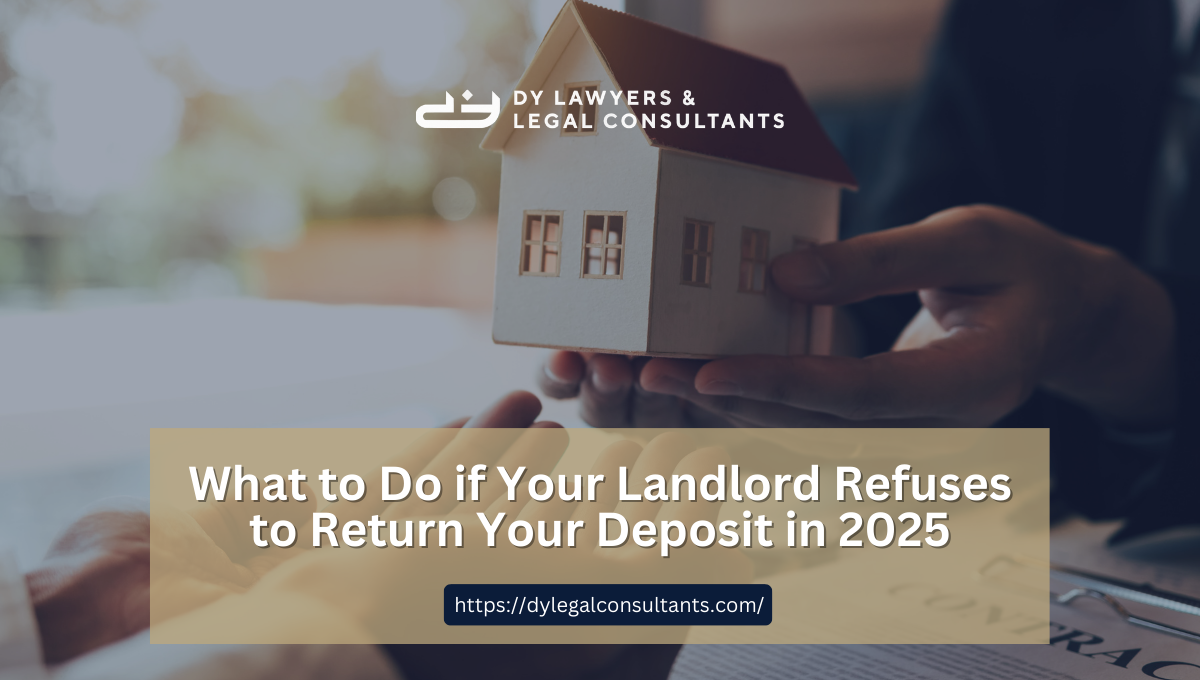Tenant-landlord security deposit disputes are common and stressful. If your landlord refuses to return your deposit, it’s important to know your rights and act promptly. In Dubai (and the UAE), tenancy law requires the landlord to refund any security deposit at the end of the lease, provided you’ve met your obligations. Deposit deductions are only valid for damages beyond normal wear and tear.
This guide explains step-by-step what you can do to recover your deposit, from reviewing your lease and documenting the property’s condition to sending a formal demand and, if needed, filing a case with the Rent Dispute Center. We also include tips on negotiation and legal remedies.
Also Read: How to Start a Business in Dubai
Know Your Rights and Lease Terms
Begin by understanding your rights and the terms of your tenancy. Under Dubai’s Tenancy Law (Law No. 26 of 2007), any maintenance (security) deposit must be refunded when the lease ends. Landlords often require a deposit (usually 1–2 months’ rent) to cover damages, but they are legally obligated to return it, or any balance, once you hand back the property.
For example, Article 20 of Dubai’s tenancy law states that the landlord shall undertake to refund this deposit, or any remaining amount, upon expiry of the contract. Likewise, Article 21 clarifies that tenants must return the premises in the same condition as received, except for normal wear and tear. In other words, routine cleaning or minor scratches do not justify withholding your deposit.
Check your lease agreement carefully: it should specify the deposit amount, conditions for deductions, and the move-out notice period. Look for clauses like deductions, termination, or condition reports. Even if your tenancy was verbal, the law still protects you. Keep your Ejari-registered contract (Dubai registration of lease) handy, since it is key evidence that establishes the lease terms and the deposit paid. In short, your contract and Dubai law both support your right to a full deposit refund if you leave the property in good condition.

Step 1: Review Your Lease Agreement
Carefully re-read the rental contract before taking any action. Confirm how much deposit you paid, and note any clauses about repairs, cleaning fees, or early termination penalties. The lease may say when the deposit should be returned (often on handover of the keys or within a certain number of days). It might also list allowed deductions (for unpaid utilities, property damage, etc.). If the landlord claims damages, see if the contract requires an official inspection report or estimates.
- Check deposit clauses: Is the deposit refundable? (In Dubai, it must be, per law.) Does it cover wear and tear or only major damage? Is there a deadline for a refund?
- Early termination terms: If you left before the lease ended, did you give proper notice? (Dubai law requires 90 days’ notice for early exit.) Without following the notice, some contracts let landlords keep part of the deposit as a penalty.
- Required procedures: Did the lease specify a walk-through or check-out report? If so, having documentation from move-in vs. move-out is useful.
Gather your signed tenancy contract (Ejari), deposit receipt, and any extension or renewal addenda. If some terms seem unfair (e.g., non-refundable deposit), remember Dubai’s law overrides them: even a written non-refundable clause can’t override the legal right to a refund of the deposit or its balance. Understanding your lease helps you pinpoint exactly what the landlord can or cannot claim from your deposit.
Also Read: Real Estate Dispute in Dubai

Step 2: Document the Property’s Condition
Evidence is crucial. The landlord may try to justify keeping some or all of your deposit by claiming damage. Protect yourself by having clear proof of the property’s state when you left. Ideally, you and the landlord should do a joint move-out inspection. During the walk-through, take dated photos or videos of every room, appliance, and fixture. Capture any scratches, holes, stains, or marks, and also show the clean, undamaged areas. If possible, do this with the landlord present so they witness the condition, and note in writing any existing damage you agreed not to deduct. Before handing back the keys:
- Take timestamped photos or videos of each room (walls, floors, windows), showing cleanliness.
- Keep copies of your move-in report (if one exists) to compare before/after.
- Make sure all utility bills (electricity, water, and gas) are paid up, and keep receipts; unpaid bills can be deducted from your deposit.
- Save all receipts for repairs or maintenance you personally arranged (e.g., fixed a leak or painted walls). You might offset small charges from the landlord’s claims by showing you already paid for those fixes.
- Obtain a written check-out report from the landlord or their agent. In Dubai, landlords often do a final inspection with the tenant and create a brief report. If your landlord skips this, send them an email asking to confirm that the property was returned in good order (for your records).
Documenting the condition thoroughly leaves no excuse for unjust deductions. As one expert advises, be vigilant if you want to get back the security deposit, as detailed before/after records make your case much stronger.
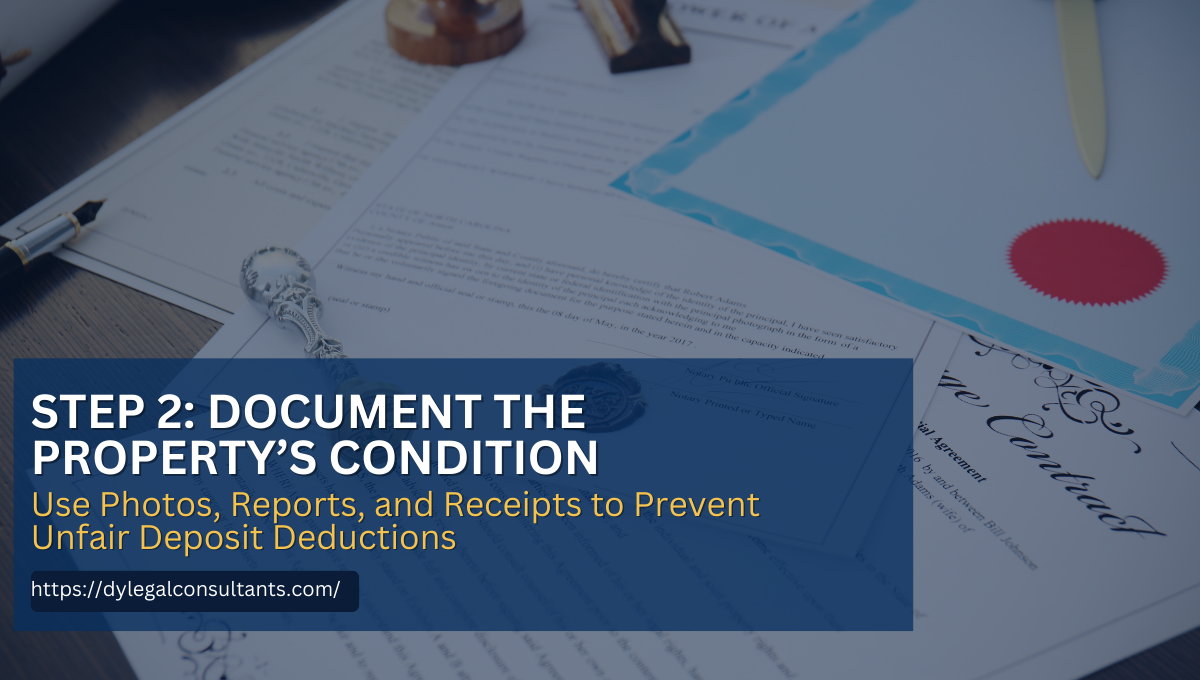
Step 3: Send a Formal Demand for Your Deposit
If the landlord still won’t return the deposit after you vacate, send a polite but firm written request. A formal demand demonstrates you are serious and creates an official record (helpful if you later go to court or the RDC). In the letter or email, state the lease details (dates, address), the deposit amount paid, and the date you moved out. Reference any relevant lease clauses or law (e.g., Dubai tenancy law Article 20) as a reminder of your rights. Give a clear deadline (for example, 7–14 days) for the landlord to refund the deposit.
For example, you might write:
Dear [Landlord’s Name],
Per our tenancy agreement dated [date], I vacated the property at [address] on [date]. As you are aware, I left the premises in good condition (see attached photos), and all bills have been paid. According to Dubai law (Article 20, Law 26/2007) and our lease, I request the refund of my security deposit of AED [amount] by [date, e.g., 14 days from now]. If I do not receive the deposit by then, I will have to pursue legal remedies (including filing a case with the Rent Dispute Center).
Sincerely,
[Your Name]
- Delivery method: Send this demand by certified mail or courier so you have proof of delivery. Also, send a copy via email and/or WhatsApp for a timestamp.
- Keep records: Save a copy of the letter and any reply. If the landlord responds (even to haggle), keep the messages for evidence.
A polite written notice often prompts a landlord to act. Many tenants report that a formal demand is all it took for the landlord to refund the deposit. If there’s still no response by your deadline, you’ll have grounds to file a complaint with authorities.

Step 4: Attempt Amicable Negotiation
Before jumping to legal steps, try to resolve the issue peacefully. Communicating in good faith can save time and money. Reach out to your landlord and calmly discuss the situation. Ask them to explain any deductions they intend to make, and point out any items where they are mistaken (e.g., normal wear and tear). Sometimes disputes arise from misunderstandings or minor complaints that can be quickly fixed. If the landlord cites damage, show them the photos/videos and receipts you have; many landlords back down when presented with evidence.
- Meet or call: A friendly conversation can work wonders. Express appreciation for the rental but concern about the deposit.
- Propose a compromise: If some cleaning or repair is legitimately needed, consider negotiating. For instance, you might agree to pay half the cost of a small repair or suggest the landlord deduct a reasonable fixed amount rather than the full deposit. (All compromises should be put in writing.)
- Mention mediation: Let the landlord know you’re aware of formal options (like Dubai’s Rent Dispute Center) and would prefer to avoid it. Sometimes just the hint of legal action encourages a landlord to cooperate.
Remember to stay calm and factual. Keep records of all communications (texts, emails, calls); you can cite them later if needed. According to expert advice, many rental disputes are resolved through amicable settlement once both sides present evidence. A contractor of DY Legal notes that even sending a notice can prompt compliance.
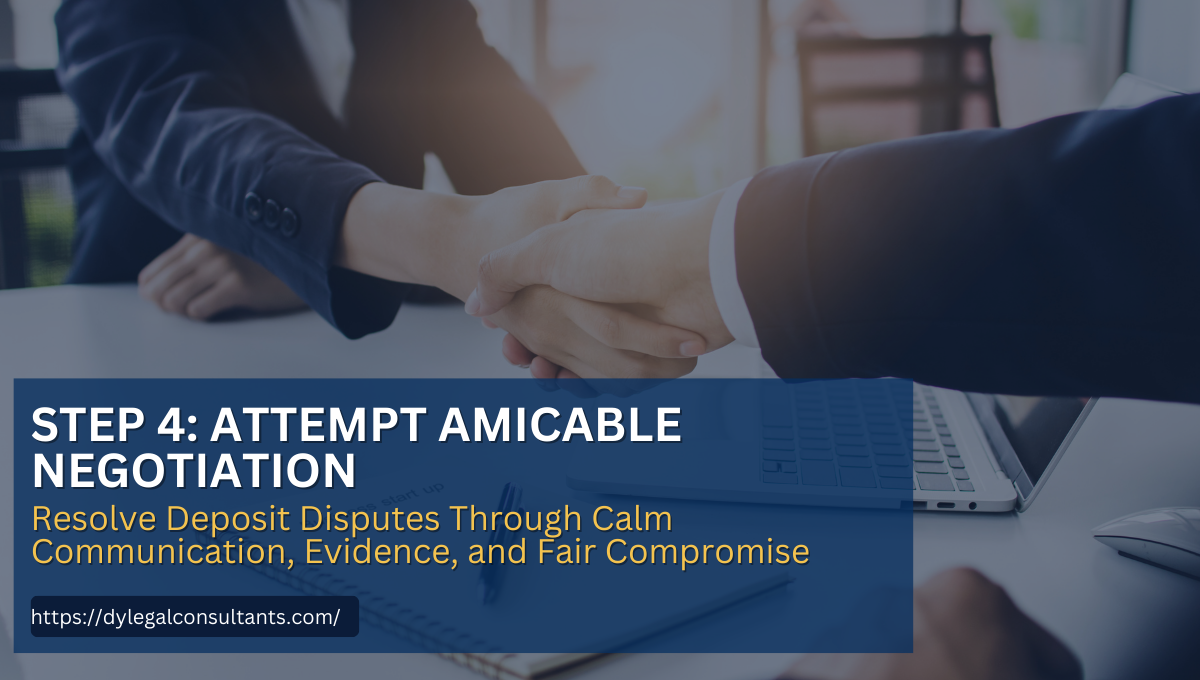
Step 5: File a Complaint at the Rent Dispute Center or Court
If negotiation fails, you’ll need to escalate formally. In Dubai, deposit disputes fall under the Rent Dispute Center (RDC), operated by the Dubai Land Department (RERA). The RDC handles tenant claims and has the authority to order deposit refunds. (Each emirate has its own system, e.g., Sharjah Real Estate Registration Authority, but we focus on Dubai here.)
1) Gather Documents
Collect all paperwork: the Ejari-registered lease contract, deposit receipt, Emirates IDs, move-in/out inspection reports, DEWA and utility bill receipts, and copies of all communication with your landlord. Include any photos/videos showing the property condition. As DY Legal advises, gather documents… contracts, title deeds, Ejari, payment proofs, notices, etc. A complete evidence package strengthens your case.
2) Submit the Complaint
Go online to the Dubai Land Department’s Rent Dispute portal or visit the RDC office in person. You will fill out a form detailing the dispute (amount of deposit claimed, reasons, etc.) and upload your documents. There is a filing fee of 3.5% of the annual rent (or lease value), with a minimum of AED 500 and a cap (see DLD guidelines). An admin fee (about AED 320) also applies. (Note: Half of the filing fee is refundable if you settle with the landlord before a ruling.)
3) Hearing and Ruling
The RDC will schedule a conciliation hearing (usually within a few weeks). A tribunal representative will meet with both parties and try to negotiate a settlement. If that fails, a formal hearing follows, often on the same day. You will present your evidence and arguments. The process is relatively fast: the RDC’s Arbitration Department aims to issue a decision in about 15 days (and no more than 30 days). If you win, the decision is enforceable, and the landlord must pay the deposit (plus any interest or compensation ordered).
4) Enforcement
If the landlord still won’t pay, the RDC verdict is an executive deed: you can enforce it like a court judgment. You might, for example, have the amount deducted from the landlord’s property sale proceeds.
In summary, filing at the Rent Dispute Center is your legal remedy of choice. It’s designed to resolve rental conflicts efficiently. Importantly, even while a case is pending, you maintain the right to propose a settlement. As Bayut notes, litigation can be avoided if a mutually acceptable solution is found through talking.
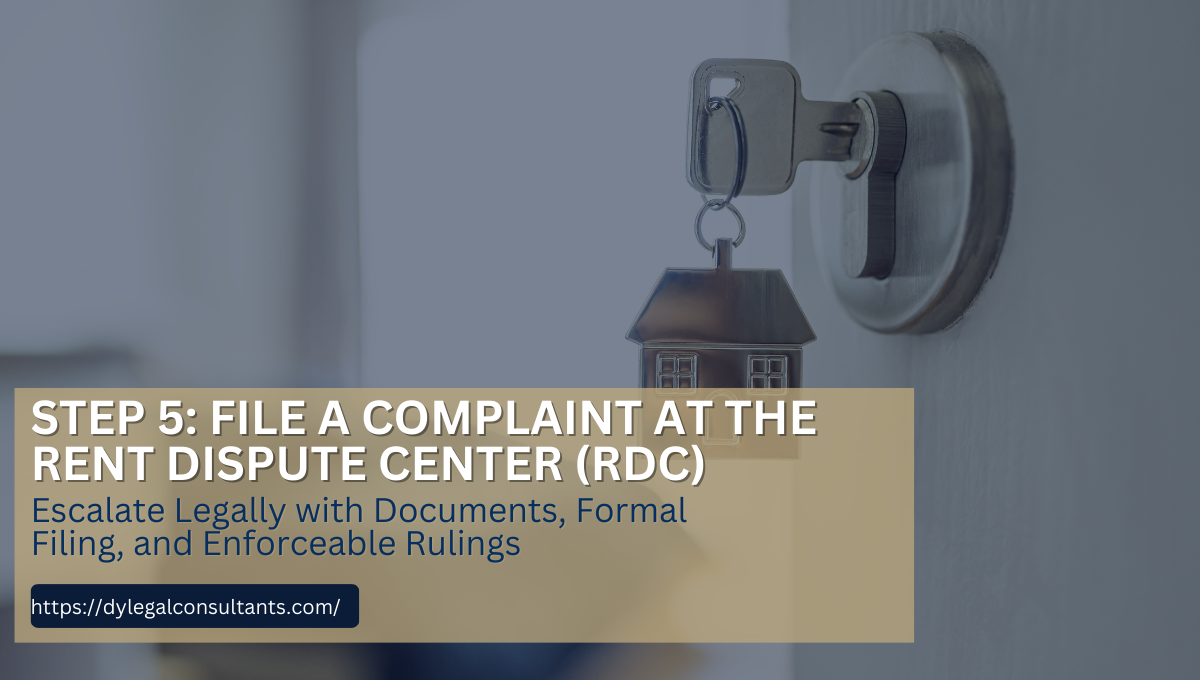
Summary of Recovery Options
|
Action |
How It Works |
Advantages |
Considerations |
|
Direct Negotiation |
Talk or meet with the landlord informally to resolve the issue. |
Fast and free; can preserve goodwill. |
The landlord may refuse or stall; there is no binding outcome. |
|
Formal Demand Letter |
Send a certified letter/email demanding the deposit refund. |
Creates a documented record of your request. |
The landlord is not legally forced to comply by letter alone. |
|
Rent Dispute Center (RDC) |
File a case with Dubai’s DLD-RERA Rent Dispute Center. |
Legally binding decision; relatively quick resolution (~15–30 days). |
Requires filing fees (3.5% of rent) and time; a formal process. |
|
Court Litigation |
Sue in court if RDC is not available/applicable. |
Official judgment; can order damages/fees. |
Long and costly; may require lawyers; only used if the RDC route is exhausted. |
The table above helps compare your options. In most cases, the RDC is the most practical; it’s specifically for rent issues and usually faster than the court. However, if your case is very large or complex, a regular civil suit may be necessary.
Also Read: Property Transfer Procedure in Dubai
When to Seek Legal Help
You are not required to have a lawyer at the RDC (many tenants represent themselves), but professional help can be valuable. A rental dispute lawyer knows the procedures, paperwork, and local judges’ expectations. They can ensure your case is presented clearly and may include legal arguments you might miss. As DY Legal notes, specialists in landlord-tenant law assist you in every stage of the rental dispute process. In fact, our own litigation team regularly represents tenants in deposit and rent cases, preparing claims and defenses through the RDC and courts. If your deposit is large or if the landlord is evasive, consulting an experienced attorney can improve your chances of success.
On the other hand, if it’s a small deposit (say, just one month’s rent) and your case is straightforward, you might prefer to proceed on your own to save costs. Many tenants file RDC cases without legal representation. The key is being organized with your evidence and following the RDC’s process.
By following the steps above, reviewing your lease, documenting everything, making a formal demand, and, if necessary, filing at the RDC, you maximize your chances of recovering your deposit. Keep all communications professional and record them. Dubai law and practice favor the tenant on deposit refunds, so stay confident. With patience and the right approach, you should be able to resolve a security deposit dispute, either through agreement or a binding RDC decision.
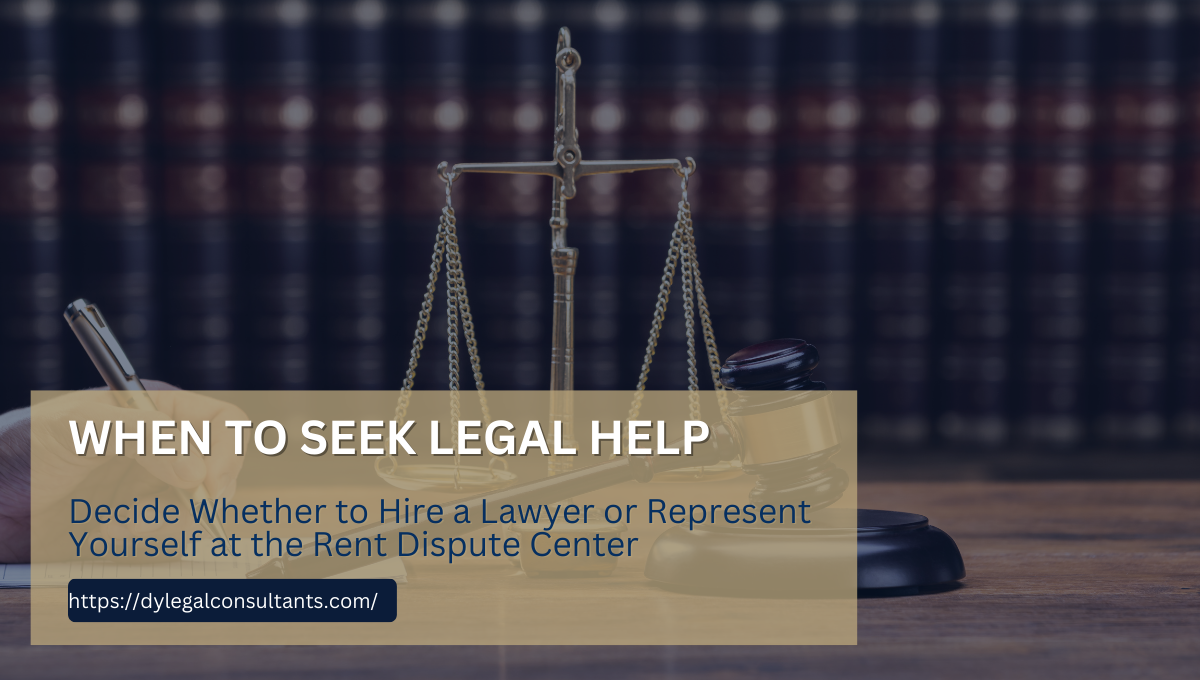
Frequently Asked Questions
How long should I wait for my deposit to be returned?
Dubai law does not set a strict deadline, but in practice, landlords are expected to refund the deposit promptly after lease expiry. Many sources advise within about 30 days. As one property guide notes, if the deposit is not returned, tenants can file a RERA (RDC) complaint. In any case, you should send your formal demand soon after moving out (see above). If there’s no response in a couple of weeks, consider escalating by lodging the dispute.
Can a landlord keep my deposit for normal wear-and-tear?
No, according to Article 21 of the Dubai Tenancy Law, the tenant must return the premises in the same condition except…shortages resulting from normal use or for reasons beyond [their] control. This means normal cleaning and minor marks are your responsibility, not the landlord’s to deduct. Only damages beyond normal wear (e.g., broken tiles, holes in walls) can be claimed from the deposit, and even then, you can require proof. Bayut’s guide explicitly states that the landlord has no legal right to simply keep your deposit. So if your landlord tries to say everyone keeps the deposit, remind them of the law: the deposit (or what’s left after actual damage) must be returned at contract end.
What evidence should I collect before contacting authorities?
Gather everything that proves your case. This includes (a) the signed tenancy contract (Ejari) and deposit receipt; (b) Emirates ID/passport copies; (c) DEWA utility bills and payment receipts; (d) move-in and move-out inspection reports or any condition checklists; (e) dated photos/videos of the property’s condition; (f) a written record of your demand notice to the landlord; and (g) any communication (text messages, emails) where you and the landlord discuss the deposit or property condition.
Do I need a lawyer to get my deposit back?
Not necessarily. Many tenants successfully handle RDC cases on their own. The Rent Dispute Center is meant to be accessible without formal legal representation. However, if you find the process confusing or the landlord is particularly uncooperative, a lawyer can help. Legal counsel can draft stronger demands, file the complaint correctly, and present your case at the hearing. Remember, even if a lawyer represents you, the RDC will reimburse half the filing fee if you settle early. DY Legal offers rental dispute lawyers who specialize in security deposit cases, if you prefer expert assistance.
What if the landlord claims I owe unpaid rent or fines?
The landlord can only deduct from your deposit what the contract and law allow. Unpaid rent can be a legitimate reason to keep money, but it must be clearly documented. (If you have paid all rent, show receipts.) For any other fees (e.g., municipality fines), check if your lease required you to pay them. In Dubai, by default, the tenant pays utility bills and fines for late rent, but contracts may vary. If the landlord’s deductions seem inflated or unjustified, ask them to provide bills/invoices. You can challenge any unsupported claims at the RDC. In any dispute, focus on the facts and evidence: paid bills vs. bills presented.
Disclaimer: The content in this article is provided for informational purposes only and does not constitute legal advice.

